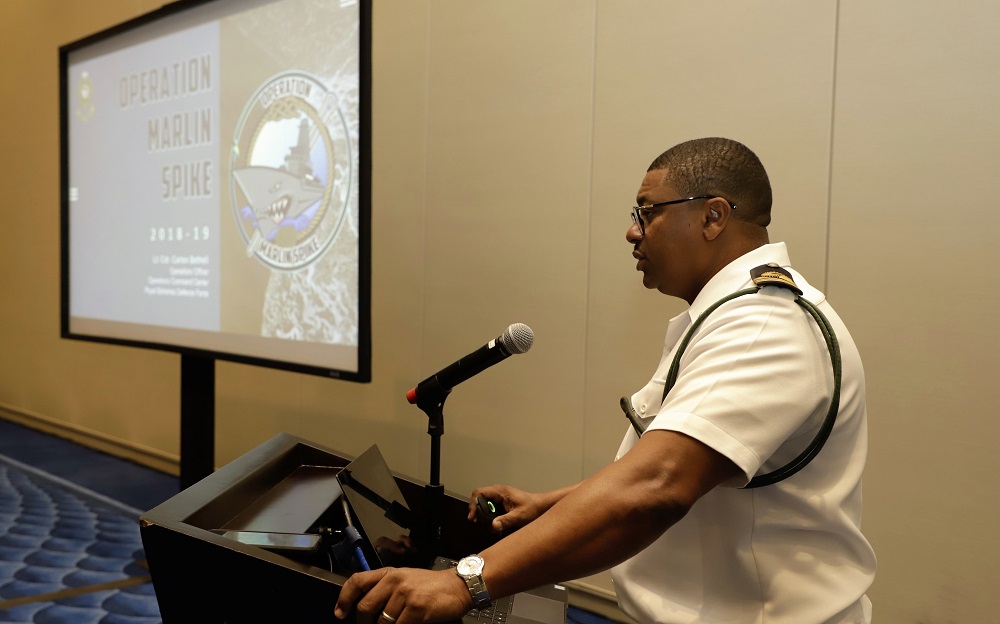Caribbean Nations synchronize their information operations capabilities
By Geraldine Cook From Diálogo

Caribbean partners use Information Operations to counter transnational threat networks.
Military and security partner nations gathered at the VII Annual Caribbean Region Information Operations Council (CRIOC) in Nassau, Bahamas, February 18-21, 2019. The objective of the meeting was to develop Information Operations (IO) strategies to counter transnational threats in the Caribbean. The Royal Bahamas Defence Force (RBDF) hosted the event with sponsorship from U.S. Northern Command (NORTHCOM) and U.S. Southern Command (SOUTHCOM).
“CRIOC enhances IO, Military Information Support Operations (MISO), and Strategic Communications (STRATCOM) by planning, coordinating, and synchronizing Caribbean partner nations’ information-related capabilities to counter transnational threat networks and strategic competitors operating in the Caribbean region,” said Dr. Benjamin P. Gochman, chief of Engagements at NORTHCOM’s IO division. “CRIOC members face many common threats, like narcotrafficking, illegal arms, gang violence, human trafficking, and illegal poaching. If we pull together our resources and conduct collective security, we can better counter those threats and respond to save lives.”


CRIOC members from The Bahamas, Bermuda, Canada, France, Great Britain, Jamaica, Netherlands, Trinidad & Tobago, and Turks & Caicos participated at the annual meeting to discuss current operations. Colombia and Mexico attended the event for the first time as observers.
“CRIOC is an opportunity to show our interest in working and collaborating with the Caribbean region and with the hemisphere. CRIOC helps to build the kind of camaraderie and networks necessary to address quite a number of illicit activities that our region faces,” said Royal Bahamas Defence Force Commodore Tellis Bethell, chief of Defence Staff. “In this process, we’re able to share information that helps us improve our techniques and tactical capabilities to do a better job with, not only communicating to the public, but also receiving information from the public, so we can do our jobs in a more effective manner.”
Developing IO capabilities
During the conference, each country presented their IO capabilities and STRATCOM plans. RBDF talked about Operation Marlin Spike, an IO/STRATCOM initiative with support from NORTHCOM to created public awareness on RBDF duties and actions in regards to the safety of Bahamians. The operation encourages public support to help RBDF to address criminal issues and to disrupt or discourage those who seek to violate The Bahamas’s laws. The campaign helps deter, prevent, and interdict criminal acts, and has an extensive outreach program, including a tip line to report criminal activities, among other programs.


Royal Bahamas Defense Force Lieutenant Commander Carlon Bethell, director of RBDF’s Operations Command Center, gave a presentation on Operation Marlin Spike. (Photo: Geraldine Cook, Diálogo)
“Marlin Spike targets messaging, influencing, and informing the public. We want to make sure the public knows what we’re doing to mitigate the challenges and threats that our country faces,” said RBDF Lieutenant Commander Carlon Bethell, director of RBDF’s Operations Command Center. “IO helps to deter the bad guys, sending them a message that makes them think twice about carrying out nefarious activities—poaching, migrant smuggling, or human trafficking.”
Mexico talked about the importance of social media for their IO campaigns. “For Mexico’s Department of the Navy [SEMAR in Spanish], IO is extremely important. We develop high-impact naval operations within the framework of the [country’s] Internal Security Law to fight transnational criminal organizations, and we’ve had very good results,” said Mexican Navy Captain Daniel Álvarez Navarrete, deputy director of the SEMAR’s Information and Influence Strategies Division. “It’s important to learn new information strategies to strengthen our capacities and develop them in support of naval operations to fulfill of our mission and positively influence the people of Mexico.”
The future of IO strategies
Jamaica Defence Force Captain Michelle Brown, an intelligence officer, said regional cooperation is crucial for the future of IO campaigns in the Caribbean region. “We have an IO plan, but we are learning a lot from our Caribbean and international partners. CRIOC allows us to highlight our strengths and weaknesses. It also provides some answers on how we can go about fixing our weaknesses,” she said. “In the long term, we’ll have more robust IO planning for all countries that are represented here. Countries that are already at an advanced stage [of IO capabilities], will become even more advanced, and those that start now, will receive guidance from other members.”
CRIOC members agreed that the Caribbean has different approaches to common threats and challenges. “Participating in CRIOC lets us know insights on how to solve common challenges,” said Royal Netherlands Forces Lieutenant Canan Babayigit, public affairs and spokeswoman in the Caribbean. “It’s interesting to participate here and to learn from other countries on how they do IO. CRIOC is a very good initiative. We don’t want to reinvent the wheel. We can exchange knowledge or experiences to get better, and to handle and react on all sorts of issues as one team.”
IO strategies help Caribbean nations build relationships and work toward a common goal. “In this region, we’re all small countries, so if we can leverage lessons learned and build on relationships, we can get better and gain experience,” said Royal Bermuda Regiment (RBR) Major Duncan E.R. Simons, RBR’s Public Relations officer. “A lot of what we do is not in the public eye. A lot of what we do is about perception, and as long as our perception is positive among our communities and target audiences, then it’s a force multiplier.”
Participants agreed to work together to develop common strategic messages to counter illicit activities. The VIII Annual CRIOC will take place in Jamaica, in March 2020.




